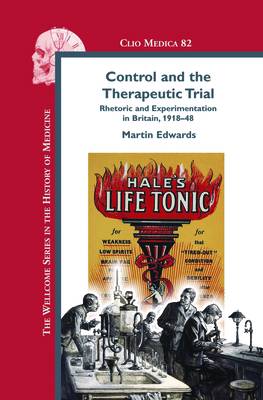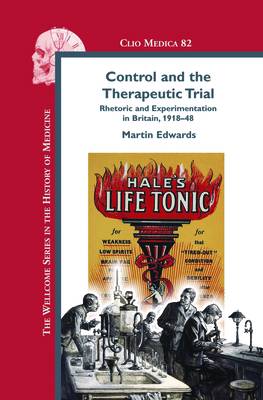
- Afhalen na 1 uur in een winkel met voorraad
- Gratis thuislevering in België vanaf € 30
- Ruim aanbod met 7 miljoen producten
- Afhalen na 1 uur in een winkel met voorraad
- Gratis thuislevering in België vanaf € 30
- Ruim aanbod met 7 miljoen producten
Zoeken
€ 123,95
+ 247 punten
Omschrijving
Listen to podcast with the author
How do doctors decide whether their drugs, or other treatments, actually work? In practice this can be fiendishly difficult. Nowadays the gold standard is the randomised controlled trial (RCT). But the RCT is a recent invention, and the story of how it came to dominate therapeutic evaluation from the latter half of the twentieth century involves acrimony, confrontation, and manipulation of the powerful rhetoric of 'control'.
Control and the Therapeutic Trial examines the development of the RCT from the eclectic collection of methodologies available to practitioners in the early-twentieth century. In particular, it explores the British Medical Research Council's (MRC) exploitation of the term 'controlled' to help establish its own 'controlled trials' as the gold standard for therapeutic evaluation, and, ultimately, the MRC itself as the proper authority to adjudicate on therapeutic efficacy. This rhetorical power still clings, and is exploited today.
Control and the Therapeutic Trial will be of interest not only to historians of twentieth-century medicine and practising clinicians who take therapeutic decisions, but to anyone who seeks a broader insight into the forces that shaped, and control, the modern controlled trial.
How do doctors decide whether their drugs, or other treatments, actually work? In practice this can be fiendishly difficult. Nowadays the gold standard is the randomised controlled trial (RCT). But the RCT is a recent invention, and the story of how it came to dominate therapeutic evaluation from the latter half of the twentieth century involves acrimony, confrontation, and manipulation of the powerful rhetoric of 'control'.
Control and the Therapeutic Trial examines the development of the RCT from the eclectic collection of methodologies available to practitioners in the early-twentieth century. In particular, it explores the British Medical Research Council's (MRC) exploitation of the term 'controlled' to help establish its own 'controlled trials' as the gold standard for therapeutic evaluation, and, ultimately, the MRC itself as the proper authority to adjudicate on therapeutic efficacy. This rhetorical power still clings, and is exploited today.
Control and the Therapeutic Trial will be of interest not only to historians of twentieth-century medicine and practising clinicians who take therapeutic decisions, but to anyone who seeks a broader insight into the forces that shaped, and control, the modern controlled trial.
Specificaties
Betrokkenen
- Auteur(s):
- Uitgeverij:
Inhoud
- Aantal bladzijden:
- 228
- Taal:
- Engels
- Reeks:
- Reeksnummer:
- nr. 82
Eigenschappen
- Productcode (EAN):
- 9789042022737
- Verschijningsdatum:
- 1/01/2007
- Uitvoering:
- Hardcover
- Formaat:
- Genaaid
- Afmetingen:
- 155 mm x 230 mm
- Gewicht:
- 512 g

Alleen bij Standaard Boekhandel
+ 247 punten op je klantenkaart van Standaard Boekhandel
Beoordelingen
We publiceren alleen reviews die voldoen aan de voorwaarden voor reviews. Bekijk onze voorwaarden voor reviews.











